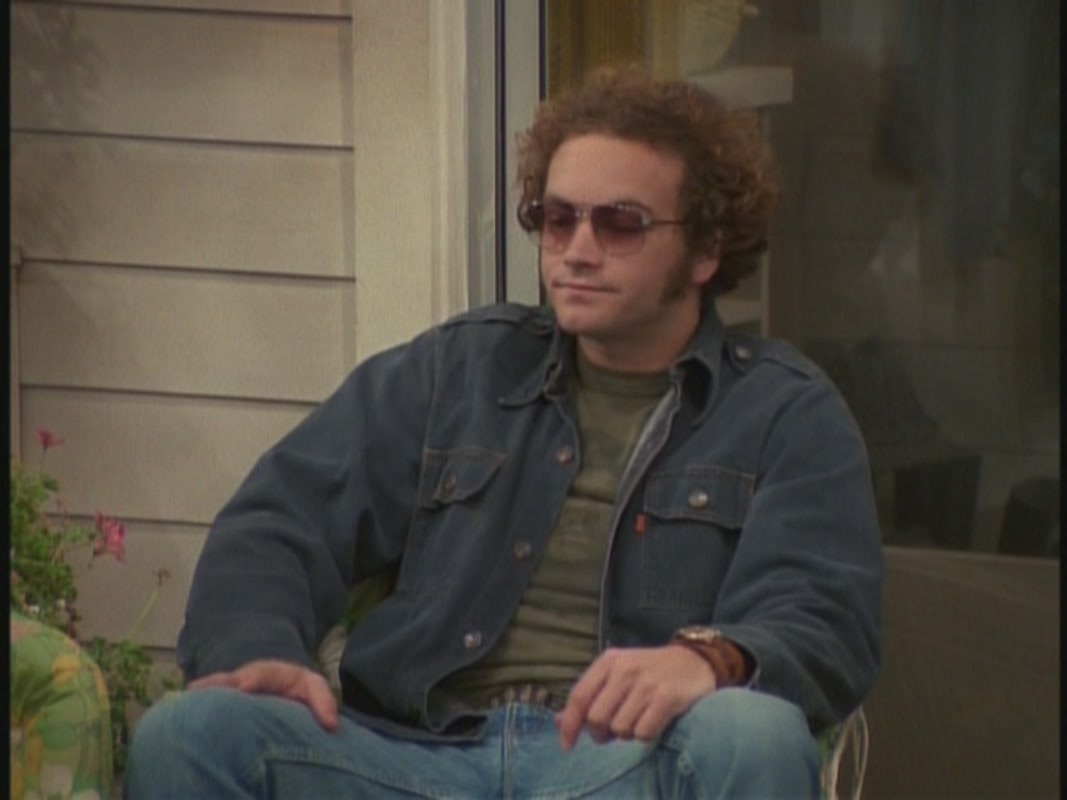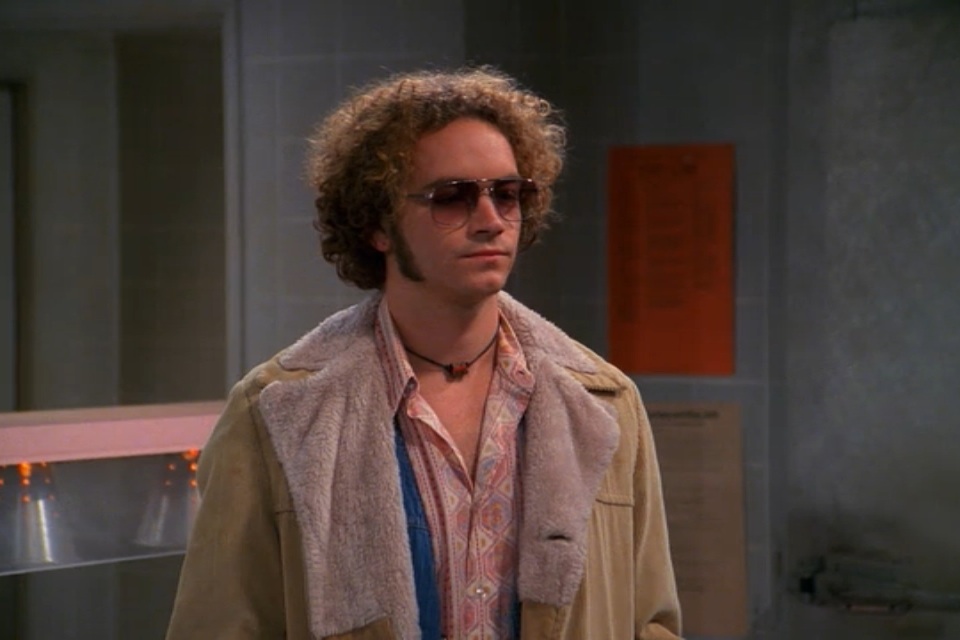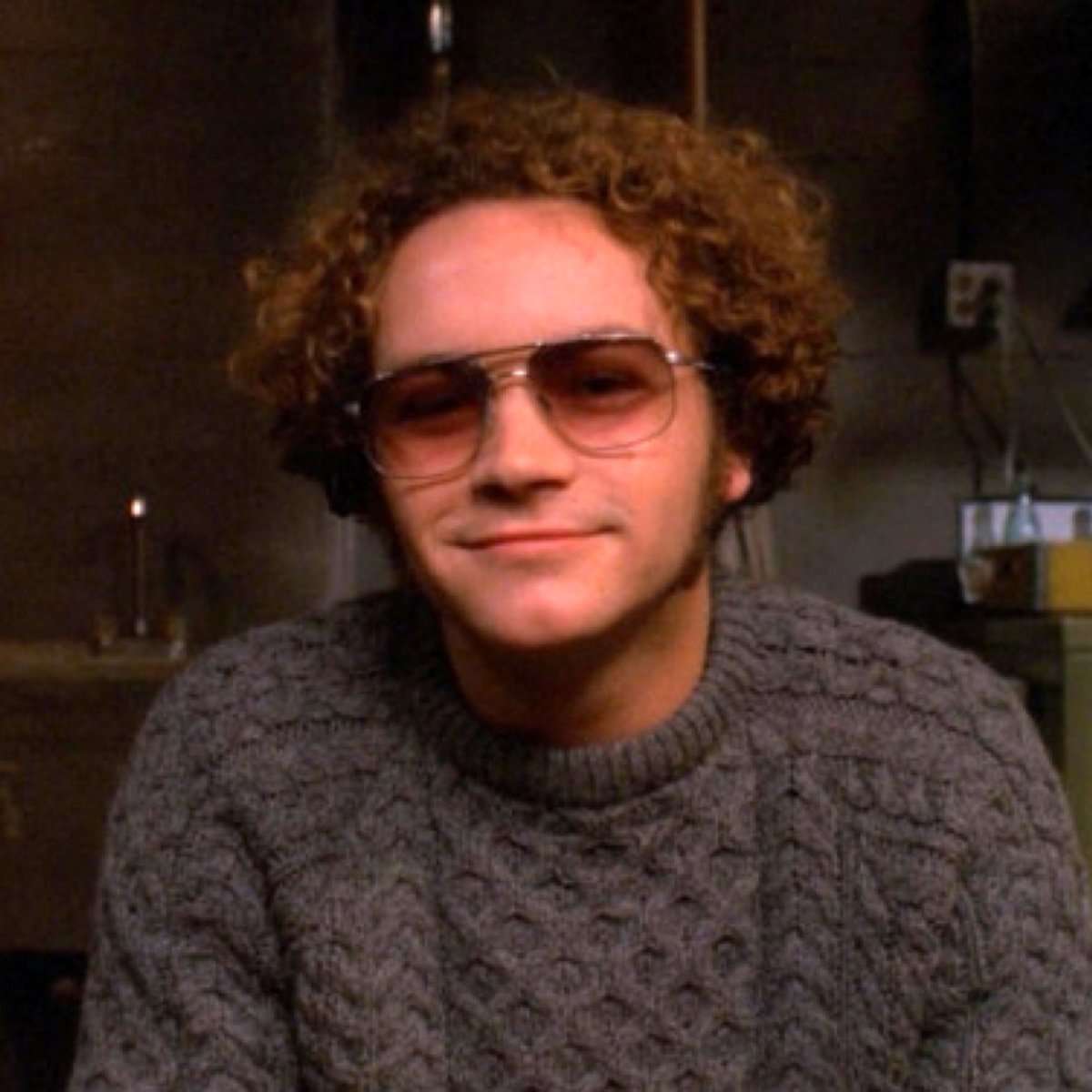Who can forget the 1970s sitcom "That '70s Show" and Hyde, one of its hilarious and beloved characters?
Hyde, portrayed by actor Danny Masterson, was a teenager living in Point Place, Wisconsin, during the 1970s. Known for his signature long hair, sarcastic wit, and rebellious nature, Hyde brought a unique charm to the show.
As a character, Hyde represented the counterculture movement of the 1970s. He challenged authority, questioned societal norms, and embraced individuality. His rebellious spirit and witty remarks made him a fan favorite. Despite his tough exterior, Hyde had a soft spot for his friends and family, proving that even the most rebellious of characters can have a heart of gold.
- Lauren Londons Kids Everything You Need To Know
- Are Patrick Dempsey And Ellen Pompeo Close Friends The Truth Revealed
Born in New York City on March 13, 1976, Danny Masterson began his acting career in the early 1990s. Before landing the role of Hyde, he appeared in several television shows, including "Cybill" and "NYPD Blue." After "That '70s Show" ended in 2006, Masterson continued to act in films and television, most notably in the Netflix series "The Ranch."
70's show hyde
Hyde, a beloved character in the sitcom "That '70s Show," embodies the counterculture movement of the 1970s. His rebellious spirit, sarcastic wit, and unwavering individuality made him a fan favorite.
- Rebellious Teenager: Hyde challenged authority and societal norms, representing the youth rebellion of the time.
- Sarcastic Wit: His sharp tongue and witty remarks provided comedic relief, making him a memorable character.
- Counterculture Icon: Hyde's long hair, rock music, and anti-establishment views epitomized the counterculture movement.
- Loyal Friend: Despite his rebellious nature, Hyde had a soft spot for his friends and family, proving his loyalty.
- Complex Character: Hyde's complexities made him relatable, as he struggled with personal issues while maintaining his rebellious exterior.
- Cultural Impact: Hyde's character resonated with audiences, influencing youth culture and popularizing the counterculture movement.
- Danny Masterson's Portrayal: Actor Danny Masterson's charismatic performance brought Hyde to life, capturing the character's essence.
These key aspects highlight Hyde's significance in "That '70s Show" and his enduring legacy as a symbol of the counterculture movement. His rebellious spirit, sarcastic humor, and unwavering individuality continue to entertain and inspire audiences.
- The Unforgettable Rebbie Jackson A Legacy Of Music And Inspiration
- Meet The Legendary Johnny Crawford A Teen Heartthrobs Journey
Rebellious Teenager
In the 1970s, a wave of youth rebellion swept across the United States, and Hyde, from the sitcom "That '70s Show," became its iconic symbol. His rebellious nature challenged authority and societal norms, resonating with a generation seeking change.
- Defiance of Authority: Hyde's rebellious spirit manifested in his defiance of authority figures, such as his parents and teachers. He questioned their rules and pushed boundaries, representing the growing discontent among youth with established norms.
- Rejection of Societal Norms: Hyde's rebellion extended beyond authority figures to societal norms. He rejected traditional values, such as conformity and materialism, embracing individuality and self-expression.
- Counterculture Values: Hyde's rebellious nature aligned with the counterculture movement of the 1970s. He embraced alternative lifestyles, including rock music, drug experimentation, and anti-establishment views.
- Symbol of Youth Discontent: Hyde's character resonated with young audiences who identified with his rebellious spirit. He became a symbol of their frustration with the status quo and their desire for social change.
Hyde's rebellious nature not only shaped his character but also reflected the broader social and cultural changes taking place in the 1970s. His defiance of authority and societal norms symbolized the youth rebellion that sought to challenge the established order and forge a new path.
Sarcastic Wit
Hyde's sarcastic wit was an integral part of his character in "That '70s Show." His sharp tongue and witty remarks provided comedic relief, making him a memorable and beloved character among audiences.
Hyde's sarcastic wit served several purposes in the show:
- Comic Relief: Hyde's sarcastic remarks often provided comic relief, breaking tension and lightening the mood of the show. His witty one-liners and sarcastic observations added humor to the dialogue and made him a fan favorite.
- Character Development: Hyde's sarcastic wit also contributed to his character development. It revealed his intelligence, quick wit, and ability to think on his feet. His sarcastic remarks often conveyed his disdain for authority and his rebellious nature.
- Audience Connection: Hyde's sarcastic wit resonated with audiences who appreciated his sharp wit and ability to challenge societal norms. His sarcastic remarks often reflected the frustrations and rebellious spirit of the 1970s youth culture.
In conclusion, Hyde's sarcastic wit was a defining characteristic that made him a memorable and beloved character in "That '70s Show." It provided comedic relief, contributed to his character development, and connected with audiences who identified with his rebellious spirit and sharp wit.
Counterculture Icon
Hyde, from the sitcom "That '70s Show," became an iconic representation of the counterculture movement of the 1970s. His long hair, rock music, and anti-establishment views embodied the spirit of rebellion and social change that defined the era.
- Long Hair: Long hair was a symbol of rebellion against traditional societal norms and values. Hyde's long, unkempt hair represented his rejection of conformity and his embrace of individuality.
- Rock Music: Rock music was the soundtrack of the counterculture movement, expressing themes of rebellion, freedom, and social change. Hyde's love for rock music reflected his alignment with the counterculture's values and its rejection of mainstream culture.
- Anti-Establishment Views: Hyde's anti-establishment views challenged the authority of the government, social institutions, and traditional values. He questioned the Vietnam War, criticized consumerism, and advocated for social justice.
By embodying these counterculture ideals, Hyde became a symbol of the youth rebellion and social change that characterized the 1970s. His character resonated with audiences who identified with his rebellious spirit and his desire to challenge the status quo.
In conclusion, the connection between Hyde's counterculture icon status and "That '70s Show" is significant as it reflects the broader cultural and social changes taking place during the 1970s. Hyde's character represented the counterculture movement's rejection of conformity, embrace of individuality, and its pursuit of social change.
Loyal Friend
In the sitcom "That '70s Show," the character Hyde is known for his rebellious and sarcastic demeanor. However, beneath his tough exterior lies a deep loyalty to his friends and family.
Hyde's loyalty is evident in several episodes. For instance, in the episode "Hyde's Father," Hyde goes to great lengths to find his estranged father, showing his love and concern for his family. In another episode, "Eric's Buddy," Hyde stands up for his friend Eric when he is being bullied, demonstrating his unwavering loyalty.
Hyde's loyalty is a key aspect of his character, as it humanizes him and makes him relatable to audiences. It shows that even rebellious individuals can have a strong sense of loyalty and compassion.
In conclusion, Hyde's loyalty is an important component of his character in "That '70s Show." It adds depth and complexity to his personality, highlighting the fact that even rebellious individuals can have a strong sense of loyalty and love for those around them.
Complex Character
In the sitcom "That '70s Show," Hyde is a complex character who struggles with personal issues beneath his rebellious exterior, making him relatable to audiences.
- Internal Conflict
Hyde grapples with inner turmoil, such as abandonment issues and a desire for acceptance. His rebellious exterior often masks his vulnerabilities, making him relatable to those who struggle with their own internal conflicts.
- Emotional Depth
Despite his tough facade, Hyde experiences a range of emotions, including love, loyalty, and sadness. His emotional depth allows audiences to connect with him on a personal level, understanding that even rebellious individuals have complex emotional lives.
- Growth and Change
Throughout the show, Hyde undergoes significant growth and change. He learns to trust others, build meaningful relationships, and confront his personal issues. His journey of self-discovery mirrors the challenges and triumphs faced by many individuals, making him a relatable and inspiring character.
- Authenticity
Hyde's complexities and flaws make him an authentic character. He is not a one-dimensional rebel but a multifaceted individual with both strengths and weaknesses. His authenticity allows audiences to relate to him on a genuine level.
By exploring Hyde's complex character, "That '70s Show" creates a relatable and compelling character that resonates with audiences. Hyde's struggles, growth, and emotional depth make him a well-rounded and unforgettable character.
Cultural Impact
Hyde, from the sitcom "That '70s Show," became a cultural icon, embodying the counterculture movement and influencing youth culture of the time.
- Rebellion and Nonconformity
Hyde's rebellious nature and rejection of societal norms resonated with young audiences, inspiring them to challenge authority and embrace individuality. His character encouraged viewers to question the status quo and express themselves authentically.
- Counterculture Values
Hyde's embodiment of counterculture values, such as anti-establishment views, appreciation for rock music, and experimentation with drugs and alternative lifestyles, made him a symbol of the counterculture movement. His character helped popularize these values and shape the cultural landscape of the 1970s.
- Youth Identity
Hyde's character provided a sense of identity for many young people who felt alienated from mainstream society. His rebellious spirit and unconventional lifestyle gave them a sense of belonging and acceptance, fostering a sense of community among youth.
- Social Commentary
Through Hyde's character, "That '70s Show" offered social commentary on the changing values and norms of the 1970s. Hyde's rebellious nature and counterculture views reflected the broader social and cultural shifts taking place during that era, providing a lens through which to examine the complexities of the time.
In conclusion, Hyde's character in "That '70s Show" had a profound cultural impact, influencing youth culture, popularizing the counterculture movement, and providing a sense of identity and social commentary during a transformative era.
Danny Masterson's Portrayal
Danny Masterson's portrayal of Hyde in "That '70s Show" was instrumental in shaping the character's enduring legacy. Masterson's charismatic performance breathed life into Hyde, capturing the character's rebellious spirit, sarcastic wit, and complex emotions.
Masterson's ability to embody Hyde's rebellious nature made the character relatable to audiences. His portrayal showcased the character's defiance of authority and societal norms, resonating with viewers who identified with Hyde's struggle for individuality.
Furthermore, Masterson's delivery of Hyde's sarcastic wit added a comedic element to the character. His sharp tongue and witty remarks provided comic relief, making Hyde a memorable and endearing character.
Beyond the rebellious and comedic aspects, Masterson's portrayal also captured the character's emotional depth. He conveyed Hyde's vulnerability and inner conflicts, revealing the character's complexities. This portrayal allowed audiences to connect with Hyde on a personal level, understanding his struggles and motivations.
In summary, Danny Masterson's charismatic performance was crucial for the success of the character Hyde in "That '70s Show." Masterson's ability to capture Hyde's rebellious spirit, sarcastic wit, and emotional depth brought the character to life, making him relatable, endearing, and enduringly popular with audiences.
FAQs on "70's Show Hyde"
This section addresses frequently asked questions about the popular character Hyde from the sitcom "That '70s Show." The answers aim to provide accurate and informative insights.
Question 1: What is Hyde's full name?
Hyde's full name is Steven Hyde, although his friends and family simply refer to him as Hyde.
Question 2: What is Hyde's signature style?
Hyde's signature style is characterized by long, unkempt hair, often tied back in a bandana. He typically wears casual clothing, such as jeans, t-shirts, and flannel shirts, reflecting his rebellious and laid-back nature.
Question 3: What is Hyde's relationship with his friends?
Hyde is a loyal and protective friend to his group, which includes Eric Forman, Donna Pinciotti, Michael Kelso, Jackie Burkhart, and Fez. Despite his rebellious exterior, Hyde deeply cares for his friends and is always there for them.
Question 4: What are Hyde's hobbies and interests?
Hyde is an avid fan of rock music, particularly classic rock bands like Led Zeppelin and The Rolling Stones. He also enjoys skateboarding, photography, and spending time with his friends.
Question 5: What is Hyde's future after "That '70s Show"?
In the spin-off series "That '90s Show," it is revealed that Hyde became a successful photographer and traveled the world. He maintains close relationships with his former friends, occasionally visiting Point Place to reminisce about their time together.
Summary: Hyde is a complex and memorable character from "That '70s Show," known for his rebellious nature, sarcastic wit, and loyalty to his friends. His unique style, hobbies, and personal journey continue to resonate with audiences, making him an enduring fan favorite.
Conclusion
In exploring the character of Hyde from "That '70s Show," we have delved into his rebellious nature, sarcastic wit, counterculture values, complex emotions, and enduring impact. Hyde represents the spirit of the 1970s youth culture, challenging societal norms and embracing individuality.
His complexities make him a relatable and unforgettable character, resonating with audiences who identify with his struggles and aspirations. Hyde's legacy extends beyond the show, influencing youth culture and popularizing the counterculture movement. As a symbol of rebellion and authenticity, Hyde continues to inspire and entertain generations of viewers.



Detail Author:
- Name : Thaddeus Howell DDS
- Username : rafael.jacobson
- Email : kuphal.stan@hahn.com
- Birthdate : 1984-01-02
- Address : 1377 Emmalee Walks Tadview, AL 26326
- Phone : 714.648.7752
- Company : Pollich, Swift and Yost
- Job : Painter and Illustrator
- Bio : Culpa voluptas nisi necessitatibus assumenda. Similique minima laudantium et rerum. Quod velit modi occaecati maxime necessitatibus ab. Expedita et sed necessitatibus nam nostrum omnis natus.
Socials
instagram:
- url : https://instagram.com/smann
- username : smann
- bio : Ab error cum nesciunt molestiae aut quae distinctio. Impedit temporibus natus est sunt.
- followers : 4430
- following : 2050
linkedin:
- url : https://linkedin.com/in/shanon.mann
- username : shanon.mann
- bio : Quo autem suscipit vel et aut harum beatae.
- followers : 5985
- following : 425
facebook:
- url : https://facebook.com/shanon.mann
- username : shanon.mann
- bio : Earum quos cumque debitis. Odit est est rerum pariatur.
- followers : 6489
- following : 482
twitter:
- url : https://twitter.com/shanon_mann
- username : shanon_mann
- bio : Debitis ipsum esse sunt velit quidem quia expedita. Unde eum consequatur quia iusto ipsa. Quas accusantium aperiam delectus aut quasi qui eos consequuntur.
- followers : 1273
- following : 1874